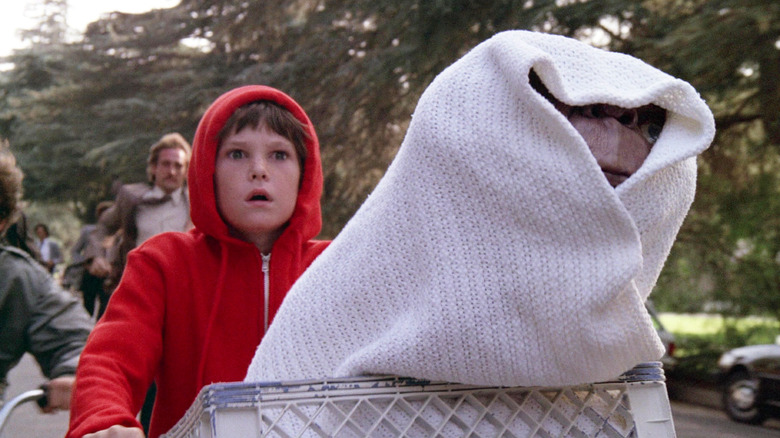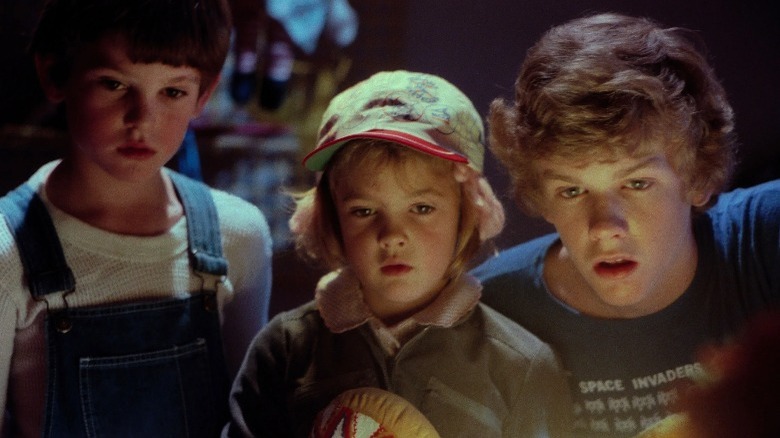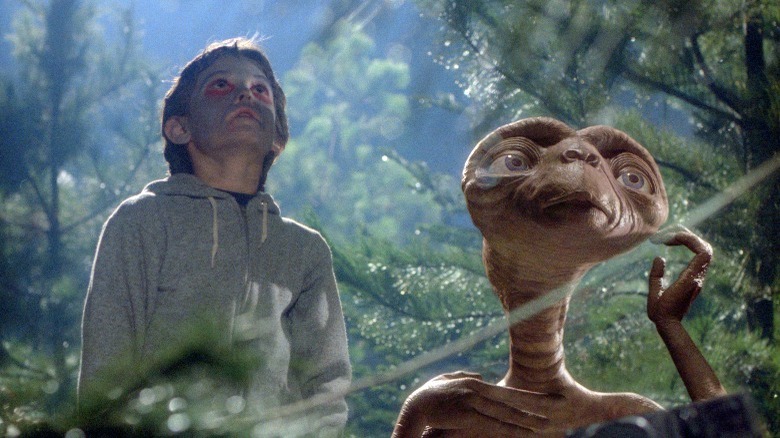Steven Spielberg Wishes He Never Edited The Guns Out Of E.T.
More than 40 years ago, Steven Spielberg gifted us with "E.T. the Extra-Terrestrial," a film about growing pains, life-altering friendships, and the inevitability of loss. A sense of childhood nostalgia is inevitably associated with "E.T.," to the point that the film's theatrical version feels near-perfect, despite its flaws (which can be very easily overlooked). On the occasion of the film's 20th-anniversary release, however, Spielberg ended up making several tweaks to the movie's original cut.
These changes were initially meant to improve on the theatrical edition, as this iteration featured modern visual effects and added new scenes to provide a definitive viewing experience for fans of "E.T." Major changes included slight sprinklings of CGI to make E.T.'s movements more seamless and fluid, along with upgrades to the technological design of the spaceship and a more vibrant color scheme. However, over time, Spielberg regretted making some of these changes, especially when it came to a particular chase sequence that originally involved firearms, which Spielberg had switched out for walkie-talkies in the special edition.
Speaking at Time's 100 Summit, Spielberg shared his views about censorship, saying that art, once put out into the world, should not be changed or revised to adapt to changing political climates or the creator's own evolving views. This led to him reflecting on the walkie-walkie tweak in the 20th-anniversary version of "E.T.," which he called " a mistake," musing that he "never should have done that." Spielberg had previously expressed similar regrets back in 2011 when he admitted that he was "overly sensitive" to parental concerns when the film was first released in 1982, which led him to make a host of changes — including digital enhancements and tweaks — 20 years later. In hindsight, Spielberg felt that it was the wrong call.
A product of its era
Once Steven Spielberg realized that he has made a mistake with the tweaks, he worked with Universal Pictures to release a two-film DVD set of "E.T." that would contain both cuts of the film. However, with time, the 2002 special edition cut became more difficult to find, with the theatrical cut becoming more widely available, especially around the time of its Blu-ray release. This might be the reason most folks remember the gun chase scene vividly, where the kids on BMXes are followed by menacing federal agents with loaded firearms, making the scene genuinely scarier than the tweaked version in the 2002 special edition.
Moreover, Spielberg elaborated his stance on the changes at Time's 100 Summit, stating that he should have "never messed with the archives of his own works," despite his evolving views over the years:
"'E.T.' is a product of its era. No film should be revised based on the lenses we now are, either voluntarily, or being forced to peer through. [...] 'E.T.' was a film that I was sensitive to the fact that the federal agents were approaching kids with firearms exposed and I thought I would change the guns into walkie-talkies. [...] I should have never messed with the archives of my own work, and I don't recommend anyone do that."
Spielberg went on to explain that all movies are markers of a creator's mindset at the time that they are made, where many aspects of a film's visual/narrative language are predominantly shaped by the trends of the times. Stories are molded through multiple lenses, including personal, cultural, and societal, and the result is an amalgamation of these factors, which always remain ever-changing. Per Spielberg, a work of art is sacrosanct, and should not be retroactively changed for any reason whatsoever.
Is censorship ever a good idea?
Steven Spielberg's comments about the gun edit in "E.T." opened a wider conversation about retroactive censorship as a whole, and he was asked about the latest edition rewrites in Roald Dahl's works, which removed language that was considered offensive. The director said:
"Nobody should ever take the chocolate out of Willy Wonka, and they shouldn't take the chocolate or the vanilla or any other flavor out of anything that's been written."
This issue does call for a more informed, nuanced conversation about censorship, and whether retroactive edits have any bearing on altering an author's intent or worldview at the time it was written. Many artists have complicated and problematic legacies, and while contemporary edits help create a more safer and inclusive space, it also risks the erasure of those very legacies.
For instance, if an artist's work contains offensive and problematic ideas, they should be remembered for exactly who they are, which opens the space for rightful criticisms levied at them and their body of work. When such works are airbrushed or tweaked later, these original intents and ideas, no matter how damaging or otherwise, are lost with time, altering our collective perception of the artist in question.
To round off his discussion about censorship, Spielberg concluded by saying that all kinds of art contribute to our history and cultural heritage and he does not believe in censorship within the context of retroactive revisionism. While the 2002 special cut might have had a longer version of the Halloween scene (with brighter colors!), the 1982 theatrical cut will always be the definitive version of "E.T."


